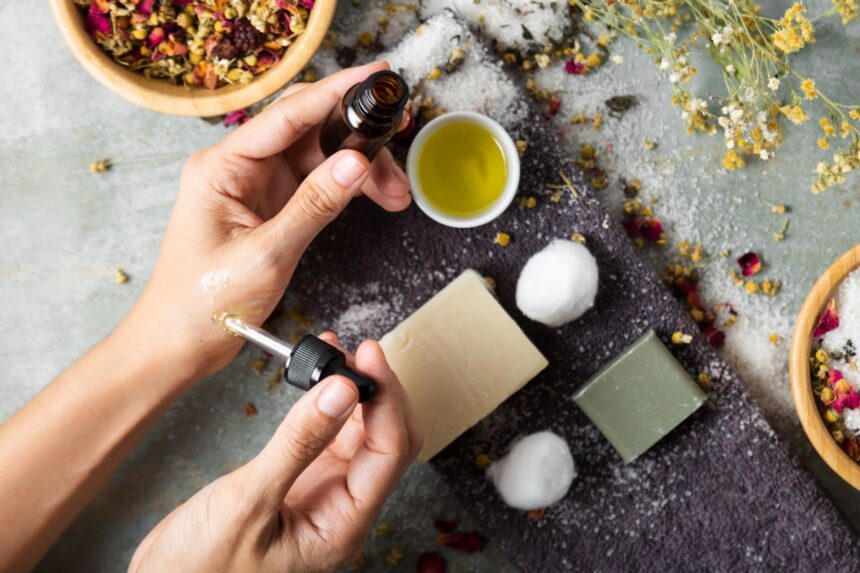There is no shortage of products with natural skincare ingredients, particularly essential oils, right now. From influencer-backed beauty routines to bold claims on clean beauty labels, they are trending hard.
You can find these ingredients in facial oils, cleansers, night creams, serums, you name it. But that begs the question: Is natural skincare always better?
The truth is, just because something is “natural” doesn’t mean it’s better or even safer. When used the wrong way, essential oils can do more harm than good. So, before you fill your shelf with nature-based formulas, let’s look at the science and safety behind these popular ingredients.
Essential Oils: A Quick Review
Essential oils are highly concentrated plant extracts. They sound clean and wholesome. After all, they come from nature, right? That’s why they’ve become go-to natural skincare ingredients, especially in products marketed as “clean” or “green.”
You’ll find them in everything from toners and cleansers to facial oils and serums. Many brands use them for fragrance or antibacterial benefits, promoting them as the heart of “natural” beauty.
But is natural skincare always better? Not really.
Just because something is natural doesn’t make it safe or effective. Poison ivy is natural too, but you definitely wouldn’t want that in your skincare routine. The same logic applies when you use essential oils for skin care. These extracts are incredibly potent, sometimes 50 to 100 times more concentrated than the original plant. And this power comes with risks.
Without proper dilution, essential oils can lead to:
- Skin irritation
- Allergic reactions
- Sensitivity to sunlight (a condition known as phototoxicity)
Contact dermatitis is the most commonly reported allergic reaction when using essential oils for skin care. So, while they smell nice, not all natural ingredients might be what your skin needs.
Sensitive Skin? Watch Out.
If you have sensitive, acne-prone, or easily irritated skin, be extra cautious when using essential oils for skin care. While they’re often marketed as natural skincare ingredients, not all of them are skin-friendly, especially when applied undiluted. Strong oils like peppermint, eucalyptus, clove, or citrus may smell refreshing, but they can easily trigger breakouts, redness, burning, or inflammation in reactive skin types.
So before you jump on the “clean beauty” train, check the label for ingredients and their concentrations. Some brands have products formulated for hypersensitive skin. While these may contain natural skincare ingredients, they’re often diluted for safe use.
You can also opt for clinical skincare, which sticks to ingredients that are proven, safe, and compatible with your skin’s natural barrier. If your skin tends to overreact, skip the DIY oil blends and stick with scientifically developed formulas designed to soothe, not stress, your skin.
The Benefits of Essential Oils in Skincare (When Used the Right Way)
While essential oils can be risky in their potent form, they do offer real value when used the right way. In controlled doses and professional formulations, they can support healthy skin and deliver real results. You should use essential oils for skin care only if they’re diluted, well-tested, and combined with other natural skincare ingredients.
Here are a few benefits of essential oils in skincare when properly formulated:
- Antibacterial support: Oils like tea tree and thyme can help reduce acne-causing bacteria when used in low concentrations.
- Soothing effects: Lavender and chamomile oil may help calm irritation and redness in sensitive or reactive skin.
- Antioxidant protection: Essential oils like rosemary or frankincense are rich in antioxidants, helping fight free radicals and environmental damage.
- Improved circulation: Some oils promote better blood flow to the skin, giving you a natural, healthy glow.
- Aromatherapy benefits: Their scents can reduce stress, which indirectly supports skin health by calming stress-related flare-ups.
The bottom line is that not all essential oils are bad for your skincare routine. But when using products containing natural plant extracts, be sure to use the ones properly diluted and backed by science.
How to Choose Products with Essential Oils for Your Skin Care
Building a natural and effective routine is often challenging, and it rests on choosing the right products. However, not all essential oils are created equal, and not every product will suit your skin type.
Here’s how to pick the best options:
- Know Your Skin Type
Whether you have dry, oily, sensitive, or combination skin, be sure the essential oils are good for your skin care needs. For example, tea tree oil is great for oily or acne-prone skin, while rosehip oil suits dry or aging skin.
- Check for Quality and Purity
Look for products that list 100% pure natural skincare ingredients without synthetic fragrances or additives. Pure essential oils are more effective and less likely to irritate your skin.
- Read The Concentration Levels
Essential oils should be properly diluted in a carrier oil or base product. High concentrations can irritate. A good product will use safe, skin-friendly ratios while still delivering the benefits of essential oils.
- Look for Targeted Benefits
Choose oils based on what your skin needs. For instance, lavender helps calm inflammation, while frankincense can improve tone and texture, and chamomile soothes sensitive skin.
- Patch Test First
Even with natural skincare ingredients, it’s smart to test a small amount before using a new product. This helps prevent any unexpected reactions, especially for sensitive skin types.
Final Thoughts
The next time you see “natural” slapped on a label, pause for a second. Ask yourself, is it scientifically proven? Is it gentle? Is it right for my skin? As effective as essential oils are for skincare, you need to use them in the right concentrations and formulations. Because when it comes to caring for your skin, the goal isn’t just to go natural, it’s to go smart.















